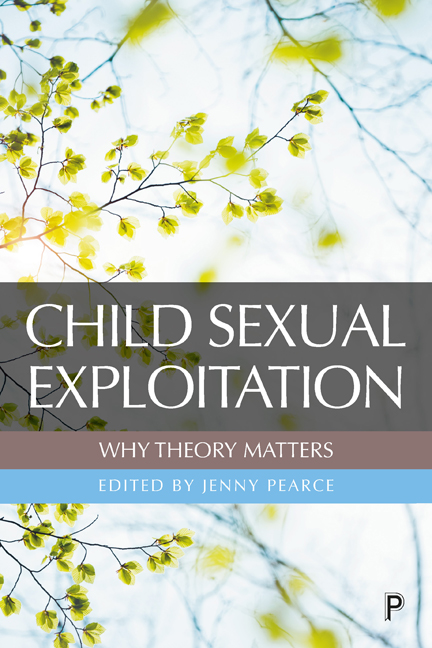Book contents
- Frontmatter
- Contents
- List of Figures and Tables
- Notes on Contributors
- Editor’s Acknowledgements
- Foreword
- 1 Bringing Theory Home: Thinking About Child Sexual Exploitation
- 2 Moving Beyond Discourses of Agency, Gain and Blame: Reconceptualising Young People’S Experiences of Sexual Exploitation
- 3 Child Sexual Exploitation, Discourse Analysis and why we Still Need to Talk About Prostitution
- 4 Contextual Safeguarding: Theorising the Contexts of Child Protection and Peer Abuse
- 5 ‘Losing Track of Morality’: Understanding Online Forces and Dynamics Conducive to Child Sexual Exploitation
- 6 Understanding Adolescent Development in the Context of Child Sexual Exploitation
- 7 Some Psychodynamic Understandings of Child Sexual Exploitation
- 8 Understanding Trauma and its Relevance to Child Sexual Exploitation
- 9 Social Support, Empathy and Ecology: A Theoretical Underpinning for Working with Young People who have Suffered Child Sexual Abuse or Exploitation
- 10 Using an Intersectional Lens to Examine the Child Sexual Exploitation of Black Adolescents
- 11 What’s Gender Got to do With It? Sexual Exploitation of Children as Patriarchal Violence
- 12 Understanding Models of Disability to Improve Responses to Children with Learning Disabilities
- 13 Some Concluding Thoughts
- Index
9 - Social Support, Empathy and Ecology: A Theoretical Underpinning for Working with Young People who have Suffered Child Sexual Abuse or Exploitation
Published online by Cambridge University Press: 10 March 2021
- Frontmatter
- Contents
- List of Figures and Tables
- Notes on Contributors
- Editor’s Acknowledgements
- Foreword
- 1 Bringing Theory Home: Thinking About Child Sexual Exploitation
- 2 Moving Beyond Discourses of Agency, Gain and Blame: Reconceptualising Young People’S Experiences of Sexual Exploitation
- 3 Child Sexual Exploitation, Discourse Analysis and why we Still Need to Talk About Prostitution
- 4 Contextual Safeguarding: Theorising the Contexts of Child Protection and Peer Abuse
- 5 ‘Losing Track of Morality’: Understanding Online Forces and Dynamics Conducive to Child Sexual Exploitation
- 6 Understanding Adolescent Development in the Context of Child Sexual Exploitation
- 7 Some Psychodynamic Understandings of Child Sexual Exploitation
- 8 Understanding Trauma and its Relevance to Child Sexual Exploitation
- 9 Social Support, Empathy and Ecology: A Theoretical Underpinning for Working with Young People who have Suffered Child Sexual Abuse or Exploitation
- 10 Using an Intersectional Lens to Examine the Child Sexual Exploitation of Black Adolescents
- 11 What’s Gender Got to do With It? Sexual Exploitation of Children as Patriarchal Violence
- 12 Understanding Models of Disability to Improve Responses to Children with Learning Disabilities
- 13 Some Concluding Thoughts
- Index
Summary
Introduction
It has been argued that while factors such as respect and compassion are critical to good practices in working in child welfare, they may sometimes be overlooked, assumed to be present or more simply, taken for granted. More specifically, while cultivating the promotion of positive and helpful social interactions among young people, their parents and the services who work with and for them is gaining momentum, it may still be seen as ‘soft’ and in need of a more declared theoretical justification base. This is particularly the case when one focuses on child protection and maltreatment and the requisite sociolegal response from both judicial and social work systems.
The particular area of child sexual abuse (CSA), which includes child sexual exploitation (CSE) under its definition, is the way this abuse can raise challenges around secrecy, shame and stigma. Often there can be reluctance for families and close relatives to want to talk about the issues because of this. Moreover, workers who support young people who are abused can themselves also struggle with the intensity and emotion of the work. We argue that the functions of empathy, social support and socialisation, and ecological theories can offer a theoretical framework to deal with these challenges and offer improved guidance for practice. In this chapter, these three interrelated approaches are explored in respect of child and youth safety, prevention of exploitation and as intervention in the sexual abuse of children. We argue that there is the need for an increasing paradigm from passive empathy, which is static, (understanding only) to activated empathy (understanding coupled with compassionate acts of support) on the part of professionals working with those who experience abuse. Alongside this, we argue that use of the theories explored enables an approach to CSA that maximises the potential of the informal and formal social network as an intervention and support mechanism.
Our overall argument is that given the delicacy of the topic of child abuse, it rightfully focuses on the cessation, the legal and or preventive elements, but sometimes implies a cooling off of social support or even a lack of willingness to intervene by others during this time. Conversely, it is strongly recommended here that there is a need to open up discourse on understanding how active empathy can act positively in the lives of those children and youth who suffer violent harm or neglect.
- Type
- Chapter
- Information
- Child Sexual Exploitation: Why Theory Matters , pp. 173 - 192Publisher: Bristol University PressPrint publication year: 2019



